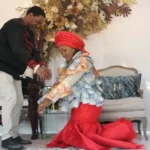The upcoming Oliver Mtukudzi International Festival of Arts (OMIFA) has been overshadowed by a bitter family feud, with Selmor Mtukudzi, daughter of the late music legend, being excluded from the event’s line-up.
The two-day festival, scheduled for September 21 and 22 at Pakare Paye Arts Centre in Norton, will celebrate the life and legacy of the late musician, who passed away on January 23, 2019, at the age of 66.
The festival, organised by Tuku Music, which manages the late musician’s affairs, aims to honour his legacy and bring together musicians and artists from across the globe. However, the event has been marred by controversy surrounding Selmor’s absence, sparking a heated debate on social media and in the Zimbabwean media.
Selmor, a musician in her own right, has been a prominent figure in her father’s musical legacy, often performing his songs at her own shows. She has also been a vocal advocate for her father’s music and legacy, even facing a public dispute with her father during his lifetime, which was later resolved.
Her absence from the festival has sparked widespread controversy, with social media abuzz with opinions and accusations. Many have expressed their shock and disappointment at Selmor’s exclusion, while others have defended the decision, citing various reasons.
The feud has pitted Selmor against her stepmother, Daisy Mtukudzi, who is the widow of the late musician. Selmor claims she was not contacted about the event, while Daisy counters that Selmor did not respond to calls from the organisers. The lack of communication and the differing accounts have fuelled speculation and further intensified the conflict.
The controversy has drawn in prominent voices from various sectors, with some urging reconciliation and others siding with either Selmor or Daisy.
Linda Masarira, a vocal women’s rights advocate and politician, has called on Daisy to unite the family, urging her to “swallow her pride” and “reunite the Mtukudzi family.” She has criticised Daisy’s treatment of Selmor since the death of her father, calling it “despicable and shameful.” Masarira’s statement reflects the widespread sentiment of concern for the family’s well-being and the need for unity in the face of such a public conflict.
Monica Zodzwa Cheru, a media and social commentator, has taken a different stance, arguing that Selmor has benefited significantly from her father’s legacy, particularly through her successful performances of his songs.
She suggests that Selmor should hold her own memorial event if she wishes to celebrate her father’s music. Cheru’s perspective highlights the complex dynamics of the family and the different interpretations of Selmor’s role in her father’s legacy.
Garikai Mazara, a former Sunday Mail Entertainment Editor, has also weighed in on the matter, suggesting that the exclusion of Selmor from the festival is a deliberate attempt to erase her from the family legacy.
He has expressed concern about the lack of clarity regarding inheritance issues and the well-being of children after the death of a parent. Mazara’s comments raise important questions about the management of the late musician’s legacy and the potential for conflict over inheritance.
Memory Mavima, another commentator, has urged Selmor to respect Daisy as the surviving spouse and to “behave like a child.” She has also pointed out that Selmor had a strained relationship with her father during his lifetime. Mavima’s perspective highlights the complexities of family relationships and the need for understanding and respect in the face of grief and loss.
Despite the controversy, several prominent figures have defended Selmor’s role in the Mtukudzi family. Robson Sharuko, H-Metro Editor, described Selmor as a “key member” of the family, arguing that she is a “walking shadow” of her father and cannot be “cut from her Tuku connection.” Sharuko’s statement reflects the widespread sentiment that Selmor’s connection to her father’s legacy is undeniable and that she should not be excluded from events celebrating his life and work.
South African-based Afro-fusion musician, Kendyman Kobiri, expressed his shock at Selmor’s exclusion, questioning the organisers’ motives. Kobiri’s reaction reflects the broader sense of disappointment and confusion felt by many fans and followers of the late musician.
Chipo Sabeta, a UK-based sports journalist, echoed this sentiment, urging Selmor and her friend Tendai Manatsa to “not go where they are not wanted.” Sabeta’s statement highlights the sense of disrespect and exclusion felt by Selmor and her supporters.
Fredy Nyakudana, a music copyright defender and composer, expressed his empathy for Selmor, stating that “being excluded from your father’s legacy is painful.” Nyakudana’s statement reflects the emotional impact of the conflict on Selmor and the broader sense of injustice felt by many.












